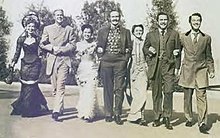Another Part of the Forest (film)
| Another Part of the Forest | |
|---|---|
 Publicity still with, from left to right, Dona Drake, Dan Duryea, Ann Blyth, Fredric March, Florence Eldridge, Edmond O'Brien, and John Dall | |
| Directed by | Michael Gordon |
| Screenplay by | Vladimir Pozner |
| Based on | Another Part of the Forest by Lillian Hellman |
| Produced by | Jerry Bresler |
| Starring | Fredric March Florence Eldridge Dan Duryea Edmond O'Brien |
| Cinematography | Hal Mohr |
| Edited by | Milton Carruth |
| Music by | Daniele Amfitheatrof |
Production company | Universal-International[1] |
| Distributed by | Universal-International |
Release date |
|
Running time | 107 minutes |
| Country | United States |
| Language | English |
Another Part of the Forest is a 1948 American drama film directed by Michael Gordon and starring Fredric March. The screenplay by Vladimir Pozner is based on the 1946 play of the same name by Lillian Hellman, which was a prequel to her 1939 drama The Little Foxes.
Plot[]
Set in the fictional town of Bowden, Alabama, in June 1880, the story focuses on the wealthy, ruthless, and innately evil Hubbard family and their rise to prominence. Patriarch Marcus Hubbard was born into poverty and toiled at menial labor while teaching himself Greek philosophy and the basics of business acumen. He made his fortune by exploiting his fellow Southerners during the American Civil War.
Shrewd, amoral elder son Benjamin is plotting to usurp his father's power and steal his money by revealing his past unscrupulous profiteering. Younger son Oscar, a Klan member, lusts for dancer Laurette Sincee. Regina is the Hubbards' sexually promiscuous daughter. She desires a life in Chicago with former Confederate officer John Bagtry. His sister, Birdie Bagtry, desperately seeks a loan on her family's valuable land, a situation Benjamin hopes to exploit in order to wrest control of the estate from his father.
In the end, when all his offspring turn on Marcus in one way or another, their mother Lavinia leaves her family for the Piney Woods. She is the only one in the household with a sense of morality.
Cast[]
- Fredric March as Marcus Hubbard
- Florence Eldridge as Lavinia Hubbard
- Dan Duryea as Oscar Hubbard
- Edmond O'Brien as Benjamin "Ben" Hubbard
- Ann Blyth as Regina Hubbard
- John Dall as John Bagtry
- Betsy Blair as Birdie Bagtry
- Dona Drake as Laurette Sincee
- Fritz Leiber as Colonel Isham
- Whit Bissell as Jugger
- Don Beddoe as Penniman
- Wilton Graff as Sam Taylor
- Virginia Farmer as Clara Bagtry
- Libby Taylor as Coralee
- Smoki Whitfield as Jake
- Rex Lease as Josh (uncredited)
Critical reception[]
Thomas M. Pryor of The New York Times called the film "a compelling entertainment" and added "Vladimir Pozner has preserved the spirit of the play in his screen treatment and Michael Gordon's direction gives a fluency to scenes which might easily have become static due to the profuseness of the dialogue."[2]
Time stated "Under Michael Gordon's direction it is a nearly perfect example of how to film a play. There is hardly a shot which does not set up visual tension against the lashing, steel-spring dialogue; there is not a single performance which is short of adequate; the work of Miss Eldridge, Mr. O'Brien and Betsey Blair, as a shaky-minded neighbor, is much more."[3]
TV Guide stated "This utterly depressing film is salvaged through intense performances that rivet the viewer, along with the literate, acerbic script."[4]
Awards and nominations[]
Screenwriter Vladimir Pozner was nominated for two Writers Guild of America Awards, for Best Written American Drama and the Robert Meltzer Award for the Screenplay Dealing Most Ably with Problems of the American Scene.
References[]
- ^ Another Part of the Forest at the American Film Institute Catalog
- ^ T.M.P. (May 19, 1948). "THE SCREEN; 'Another Part of the Forest,' More About Hubbard Family, New Film at the Rivoli". The New York Times.
- ^ "The New Pictures May 31, 1948". Time. May 31, 1948. Archived from the original on February 1, 2011.
- ^ "Another Part of the Forest". TV Guide. Retrieved March 26, 2017.
External links[]
- 1948 films
- English-language films
- 1948 drama films
- American drama films
- American films
- American films based on plays
- Films set in Alabama
- Films set in the 1860s
- Films set in the 1870s
- Films set in 1880
- Films about the Ku Klux Klan
- American black-and-white films
- Films based on works by Lillian Hellman
- Films directed by Michael Gordon
- Universal Pictures films
- Films scored by Daniele Amfitheatrof